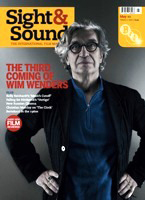News
The May 2011 issue – on sale 5 April

Our May issue immerses itself in several fascinating cinematic frontiers: a women’s-eye view of the American West and the western; the apocalyptic wilds of a fog station in Russia’s partly radioactive Arctic east; and the al fresco dance documentary as filmed in 3D.
To start with the latter: Wim Wenders’ Pina is “a monument and a memento mori” to the late choreographer Pina Bausch, notes our reviewer Sophie Mayer. Following our interview last month with Cave of Forgotten Dreams’ Werner Herzog, his compatriot tells Nick James how 3D technology “will help documentaries to a whole different level.” (And as with last month’s cover star Woody Allen, Wenders is a waylaid hero well worth reappraisal: Nick Roddick investigates the director’s roving 42-year career in documentaries.)
Kelly Reichardt resolved to make a film about the ‘Terrible Trail’ through the Oregon High Desert while scouting locations for her previous film Wendy and Lucy (2008). “As taciturn as True Grit is prolix,” in the words of our reviewer Kate Stables, Meek’s Cutoff follows three emigrant wagon families on a withering trek into the unknown, scored to the sounds of male bluster and women’s unchosen work: in lieu of most noisy masculine myths of the West it unfolds novelist Marilynne Robinson’s proposed “West dominated by space and silence.” Reichardt tells Graham Fuller how filming in classical Hollywood Academy ratio serves up the visual metaphor of a bonnet frame (and changes both landscape and time), while Edward Buscombe probes the movies’ other instances of pioneer women.
Strange flowerings have been sighted in Russian art cinema over the past decade, often turning on the “rather folkloric notion of the traveller coming a cropper in a strange land far from home,” as Leslie Felperin's survey of recent Russian films attests. Alexei Popogrebsky’s How I Ended This Summer – winner of the acting award at last year’s Berlin Film Festival, and the best film award at London – takes the fable to an extreme: it’s a widescreen, edge-of-the-world thriller whose plot triangulates “an older man, a younger man, and time and nature. They relate in completely incompatible ways. This is a film about time, and about timing,” he relates to Nick Hasted.
And while we're on the subject of time, “people like numbers,” artist-filmmaker Christian Marclay tells Jonathan Romney. “It’s 24 hours, and ‘How long did it take you?’ and ‘How many films?’ and ‘How many hours a day did you work?’” Marclay’s day-long The Clock, a remarkably seamless collage of movie clips showing the measurement of time, is both a study of time and itself an always-correct timepiece: a brilliant memento mori.
Nottingham heartbreakers Tindersticks have been (as a group or individually) writing soundtracks for the films of Claire Denis for a decade and a half now. To mark the release of a box-set of their six complete scores, our May issue in the UK comes with a free CD sampling nine of those tracks; inside the magazine, band members talk James Bell through all nine and their collaboration with Denis. (Non-UK readers can find a web link to the tracks online.)
And if that’s not enough romantic melancholia for you, Miguel Marías recounts the myriad resonances by which Alfred Hitchcock’s 1958 tragedy Vertigo – “the story of Scottie Ferguson’s obsession with three people in one” – has taken hold of the world’s imagination in the years since its release, in the second of our countdown features to our ‘greatest films of all time’ poll net year.
Elsewhere in this issue, Tony Rayns looks back at Bernardo Bertolucci’s emergence from the shadow of his mentors Pasolini and Godard in the early 1960s, Peter Bogdanovich remembers his debut and Old Hollywood elegy The Last Picture Show, Nathaniel Mellors tells Isabel Stevens about his artists’-film/sitcom hybrid Ourhouse, Joseph Bevan watches the late John Samson’s documentaries of the different, John Wrathall recalls Eric Red’s forgotten 1988 hitmen debut Cohen and Tate, Charles Gant tracks the box-office fortunes of the modern moneyed class on film, Nick Roddick questions the thinking behind the newly formed Creative England, and our editor sets out the wherefores of our forthcoming reduction of our magazine credits listings.
We’ve reviews of 31 new film releases, including Lucien Castaing-Taylor’s sheep-herding documentary Sweetgrass, our film of the month – and 20 DVD releases, including Michelangelo Antonioni’s early La signora senza camelie and Le amiche, Robert Kramer’s masterpiece Milestones and dramatic PBS talk show Firing Line. And our Books section tackles J. Hoberman’s history of American cold-war movies, Philip French’s movie memoir, Jules Dassin’s Night and the City and Stanley Kubrick’s nevermade Napoleon.
Subscribe today, save £9 on the cover price, get a free DVD and receive new issues hot off the press and direct to your door!
See also
The road goes on forever: Nick Roddick travels Wim Wenders’ early American landscapes and European mindsets (January 2008)
Strange energies from the east: Jonathan Romney on Russian finds at the Berlinale festival, including sci-fi cult attraction extraordinaire (February 2011)
The Banishment reviewed by Julian Graffy (September 2008)
Man to man: Edward Buscombe on Brokeback Mountain and male bonding in the western (January 2006)
What Time is it There? reviewed by Tony Rayns (July 2002)
Desire is violence: Chris Darke on the films of Claire Denis (July 2000)
Side tracks: Geoff Andrew catches Le quattro volte at the Cannes Film Festival (May 2010)
